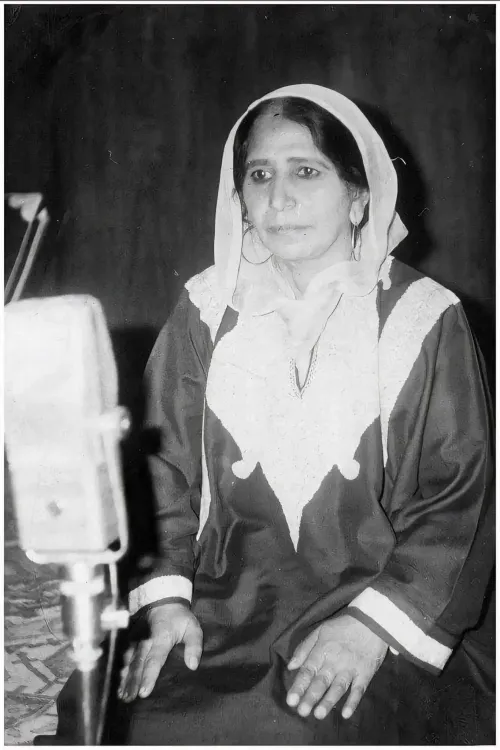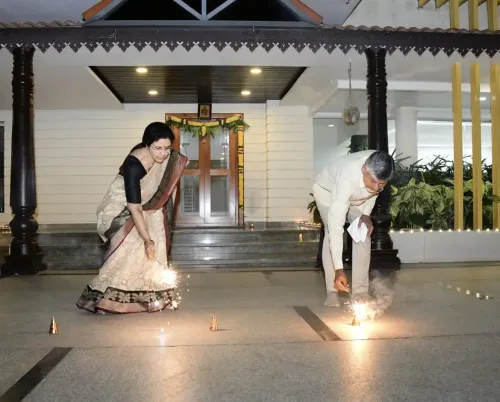Who Was Raj Begum? When Kashmir Sang While Terror Sought to Silence It

Synopsis
Key Takeaways
- Raj Begum was a pioneer in Kashmiri music, representing a rich cultural tradition.
- She faced and overcame societal barriers to pursue her passion for singing.
- The rise of terrorism severely impacted Kashmir’s artistic landscape.
- Her legacy serves as a reminder of what was lost and what must be reclaimed.
- Understanding her story is essential for recognizing Kashmir's cultural identity.
New Delhi, Aug 31 (NationPress) In the present-day Kashmir, the name Raj Begum is largely forgotten. To countless individuals across India, she remains an obscure figure, her legacy submerged beneath 35 years of terror orchestrated by Pakistan. Even in her birthplace, where her voice once resonated across the valley's serene meadows and flowing streams, violence and time have shrouded her memory.
However, for those who experienced Kashmir before the shadow of terrorism loomed in 1989, Raj Begum was more than just a singer; she was a household name, an embodiment of feminine strength, and a beacon of Kashmiri cultural heritage.
Her history is not lost in the annals of time; it spans a mere 35 years, a narrative truncated not by age but by the systematic suppression of an entire cultural legacy by extremists who unleashed terror under the guise of religion.
Three decades ago, she was not just a vocalist; she represented a movement, illustrating how artistry can break societal barriers. Born into a conservative milieu, Raj Begum bravely pursued her passion in a society where public performances were seldom an option for women, especially among Muslims. She confronted personal adversities, societal biases, and cultural skepticism, yet her voice transcended these obstacles.
Her melodies were more than mere performances; they echoed the essence of Kashmir. She sang of love, nature, divinity, and the everlasting allure of the valley.
To honor her remarkable contributions to music, she received the Padma Shri and numerous other accolades. Generations of Kashmiris grew up enchanted by her dulcet tones, with her songs becoming an integral part of life’s milestones—weddings, radio broadcasts, and cultural gatherings.
Yet, for today’s youth, particularly those born post-1990, Raj Begum is a name rediscovered rather than remembered. Their experiences have been shaped by a different reality—one filled with gunfire, explosions, curfew-induced silence, and mourning. For them, music has often become a luxury overshadowed by the struggle for survival.
Discovering that Kashmiri Muslim women like Raj Begum, Naseem Akhtar, and Shamima Dev Azad once commanded respect and admiration in the valley comes as a revelation. For some, it seems almost unfathomable.
Raj Begum was not isolated in her craft. Other Muslim female artists, such as Zoon Begum and Shamima Dev Azad, were part of a vibrant musical community that voiced the soul of Kashmir.
Hasina Akhtar, another luminary, was celebrated not only for her singing but also for her elegant dance—her captivating performances won her admiration across the valley.
Additionally, remarkable female artists from the Kashmiri Pandit community, including Asha Kaul, Neerja Pandit, Kailash Mehra Sadhu, and Naina Saproo, collectively enriched the valley’s cultural tapestry with shades of unity, elegance, and shared heritage.
Kashmir has always embraced its unique musical traditions, rich in spirituality and tailored for various occasions. Despite being male-dominated, women like Raj Begum pursued their artistic dreams.
Music and dance were interwoven into the fabric of everyday life, enhancing the beauty of its snow-capped peaks, winding rivers, sparkling springs, and lush meadows adorned with a myriad of blossoms.
However, the 1990s ushered in a wave of terrorism that infiltrated every aspect of daily existence. With it came fear, restrictions, and a systematic dismantling of Kashmir’s cultural identity. The ensuing decades claimed more than just lives; they eroded traditions. Music, once a collective joy, became one of the first casualties. Public performances dwindled, artists either vanished or fell silent, and the venues where melodies once flourished turned into voids, replaced by the harsh sounds of violence.
This was not a mere coincidence. The rise of terrorism brought with it an ideology aimed at obliterating everything Kashmir had represented for millennia. Its 5,000-year legacy of coexistence, its syncretic Sufi customs, its embrace of religious diversity, and its music were all deemed incompatible with the rigid, joyless perspective of the extremists.
The separatist and religious leaders, influenced by Pakistan, suppressed the intellectual freedom of ordinary Kashmiri Muslims. Consequently, this led to a cultural amnesia, where an entire generation grew up unaware of the artists who once gave Kashmir its voice.
Music, singing, and dance were labeled un-Islamic; cinema houses were bombed; women were coerced into veils under threat; acid attacks enforced compliance; and public entertainment was erased from daily life.
The atmosphere of fear was so pervasive that even in 2013, the all-girl rock band 'Pragaash' disbanded after receiving threats and being branded as "un-Islamic".
Generations forgot that for centuries, Kashmiri women publicly sang and danced at festivals and weddings. Music had once been a vital part of daily existence.
For many individuals like Daanish Nabi and Rahul Khazanchi, both born after 1990 when terrorism entrenched itself in Kashmir, the name Raj Begum only emerged when Bollywood opted to produce a film about her.
Their initial response was disbelief—was she a real person? Could a Muslim woman from Kashmir have been a celebrated singer? Their inquiries reflected the astonishment many experienced after viewing 'The Kashmir Files', unveiling long-suppressed truths that are now undeniable.
Raj Begum's narrative serves as a poignant reminder of what has been lost, yet also signifies what endures beneath the silence. Her voice, preserved in recordings, continues to embody a Kashmir that many today have never encountered—a Kashmir filled with tranquility, beauty, and artistic liberty. Her songs are not merely music; they are archives of a time when melody and meaning shaped the valley's identity.
Born on March 27, 1927, in Srinagar, Raj Begum began her journey as a wedding singer before joining Radio Kashmir in 1954. With encouragement from her father, she became one of the valley's most recognizable voices in the 1950s and beyond, singing until the violence that engulfed Kashmir silenced much of its music.
Raj Begum passed away in 2016 at the age of 89. Almost a decade later, her voice still resonates—echoed in her haunting Kashmiri verse, Kya kya vanay ai dost che, kam kam sitam mashrav me... kus zahre gum kor nosh main, kam neze - chok vatray main... ("How much will I tell you, my friend, what all cruelty I have overcome, what poisonous sadness I endured...").
For some, hearing Raj Begum's voice for the first time is an awakening—a realization that their land was once home to women who not only sang but did so with dignity, acclaim, and unapologetic pride.
To remember Raj Begum is not merely to celebrate a vocalist; it is to acknowledge a significant fragment of Kashmir's history that Pakistan-sponsored terror mechanisms attempted to obliterate. It is to reclaim a heritage that belongs to all Kashmiris, irrespective of their religion or background.
(Deepika Bhan can be contacted at deepika.b@ians.in)









